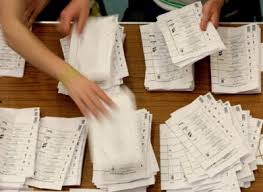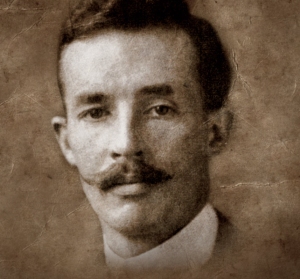
Portrait of the Irish poet Oliver St. John Gogarty painted by Sir William Orpen in 1911. Currently housed at the Royal College of Surgeons in Ireland.
(Dr Oliver St John Gogarty – companion of James Joyce and of Michael Collins)
On Bloomsday people all over the world celebrate the Dublin of Michael Collins’ life and times.
Is there any other work of fiction which has spawned its own international commemoration day?
Many James Joyce fans know by heart the opening scenes of his seminal novel “Ulysses”. Devotees may be aware that Joyce himself once shared an apartment in that same fabled tower with friends, including Oliver St John Gogarty.
Gogarty, “a surgeon and man of letters,” was a noted poet of his day. He published fictionalized accounts of Dublin life (Tumbling in the Hay, 1939), as well as a number of other works.
Joyce’ flatmate Dr Gogarty was also a close friend of Michael Collins. It was he who fulfilled the sad duty of preparing his boon companion for lying in state. It is believed that he also acted as official medical examiner, and may have produced an autopsy report … now apparently lost to history.
Gogarty’s Witness Statement to the Bureau of Military History may be read in its entirety here .
Read more:
“The Assassination of Michael Collins:
What Happened At Béal na mBláth?”

by S M Sigerson
Paperback or Kindle edition here:
www.amazon.com/dp/1493784714
For all other e-book formats see Smashwords
page: www.smashwords.com/books/view/433954
Best Reads of the Year – Rabid Readers Reviews
http://www.rabidreaders.com/2015/01/05/best-rabid-readers-reveiws-reads-of-2014/
Ulysses by James Joyce
amazon page:
http://www.amazon.com/Ulysses-James-Joyce/dp/1494405490
Project Gutenberg ebook online
https://www.gutenberg.org/files/4300/4300-h/4300-h.htm
As I Was Going Down Sackville Street
by Oliver St. John Gogarty
https://www.goodreads.com/book/show/1163144.As_I_Was_Going_Down_Sackville_Street












